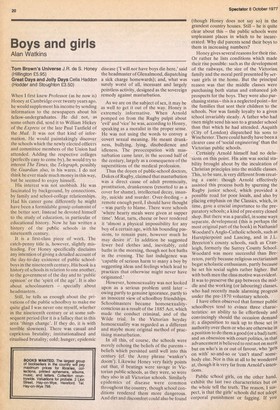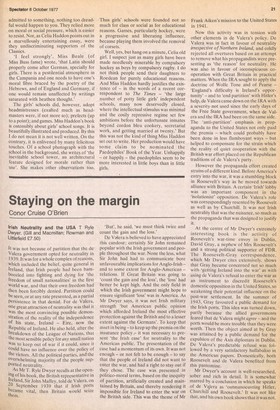Boys and girls
Alan Watkins
Tom Brown's Universe J.R. de S. Honey (HIllington £5.95) Great Days and Jolly Days Celia Haddon (Hodder and Stoughton £3.50) When I first knew Professor (as he now is) lioney at Cambridge over twenty years ago, he would supplement his income by sending information to the newspapers about his fellow-undergraduates. He did not, as some others did, send it to William Hickey of the Express or the late Paul Tanfield of the Mail. it was not that kind of information. He would painstakingly discover the schools which the newly elected officers and committee members of the Union had attended. Adding the respective colleges (perfectly easy to come by), he would try to interest The Times, the Telegraph, possibly the Guardian also, in his wares. I do not think he ever made much money in this way, but he seemed to enjoy himself.
His interest was not snobbish. He was fascinated by background, by connections, by family and school-college relationships. Had his career gone differently he might have been a formidable gossip columnist of the better sort. Instead he devoted himself to the study of education, in particular of educational history. Now he has written a history of the public schools in the nineteenth century.
It is a First-class piece of work. The catch-penny title is, however, slightly misleading, For Honey specifically disclaims any intention of giving a detailed account of the day-to-day existence of public schoolboys in the nineteenth century. His book is a history of schools in relation to one another, to the government of the day and to 'public opinion' or the `spirit of the age'. It is also about schoolmasters — specially about headmasters.
Still, he tells us enough about the privations of the public schoolboy to make me quite glad I was never one myself, whether in the nineteenth century or at some subsequent period (for it is a fallacy that in this area 'things change'. If they do, it is with terrible slowness). There was casual and capricious brutality; institutionalised and ritualised brutality; cold; hunger; epidemic disease ('I will not have boys die here,' said the headmaster of Glenalmond, dispatching a sick charge homewards); and, what was surely worst of all, incessant and largely pointless activity, designed as the sovereign remedy against masturbation.
As we are on the subject of sex, it may be as well to get it out of the way. Honey is extremely informative. When Arnold pomped on from the Rugby pulpit about 'evil' and 'vice' he was, according to Honey, speaking as a moralist in the proper sense. He was not using the words to convey a covert sexual meaning. He meant drunkness, bullying, lying, disobedience and idleness. The preoccupation with masturbation came later, in the second half of the century, largely as a consequence of the superstitions of the medical profession.
Thus the doyen of public-school doctors, Dukes of Rugby, claimed that masturbation was a direct cause of adult promiscuity, prostitution, drunkenness (resorted to as a cover for shame), intellectual decay, insanity, suicide and murder. Over-feeding — a remote enough peril, I should have thought — was partly to blame. There were schools 'where hearty meals were given at supper time'. Meat, tarts, cheese or beer rendered it 'almost a physical impossibility for any boy of a certain age, with his bounding passions, to remain pure, however much he may desire it'. In addition he suggested fewer bed clothes and, inevitably, cold baths in the morning, though not hot baths in the evening. The last indulgence was 'capable of serious harm to many a boy by suggesting ideas and feelings which lead to practices that otherwise might never have originated.'
However, homosexuality was not looked upon as a serious problem until later — owing partly to genuine ignorance, partly to an innocent view of schoolboy friendships. Schoolmasters became homosexualityconscious as a result of the 1885 Act, which made the conduct criminal, and of the Wilde trial. In the Victorian heyday homosexuality was regarded as a different and maybe more original method of practising masturbation.
In all this, of course, the schools were merely echoing the beliefs of the parents — beliefs which persisted until well into this century (cf. the Army phrase ‘wanker's doom'). Likewise Honey very fairly points out that, if beatings were savage in Victorian public schools, as they were, so were they also in all Victorian schools. Similarly epidemics of disease were common throughout the country, though school conditions rendered them more dangerous. And dirt and discomfort could also be found (though Honey does not say so) in the grandest country houses. Still — he is quite clear about this — the public schools were unpleasant places in which to be incarcerated. Why did parents send their boys to them in increasing numbers?
Honey gives several reasons for their rise. Or rather he lists conditions which made their rise possible: such as the development of the railways, the size of the Victorian family and the moral peril presented by servant girls in the home. But the principal reason was that the middle classes were purchasing both status and enhanced job prospects for the boys. They were also purchasing status this is a neglected point for the families that sent their children to the schools. Nor was family loyalty to a given school invariably steady. A father who had risen might send his son to a grander school than that which he had attended. Asquith (City of London) dispatched his sons to Winchester. There could hardly have been a clearer case of 'social engineering' than the Victorian public schools.
Certainly Arnold himself had no delusions on this point. His aim was social stability brought about by the inculcation of Christian principles into the middle classes. This, to be sure, is very different from creating a caste: though Arnold effectively assisted this process both by spurning the Rugby junior school, which provided a possible road for poor locals, and also by placing emphasis on the Classics, which, in time, gave a crucial importance to the preparatory schools; a kind of pre-entry closed shop. But there was a parallel, in some ways separate, development (this is perhaps the most original part of the book) in Nathaniel Woodard's Anglo-Catholic schools, such as Hurstpierpoint and Lancing, and in J.L. Brereton's county schools, such as Cranleigh, formerly the Surrey County School. Woodard was more successful than Brereton, partly because religious sectarianism begat scholastic enthusiasm, partly because he set his social sights rather higher. But with both men the class motive was evident. It was to preserve the gap between the middle and the working (or labouring) classes, who had recently made alarming progress under the pre-1870 voluntary schools.
I have often observed that former public schoolboys tend to evince three characteristics: an ability to lie effortlessly and convincingly should the occasion demand it; a disposition to suck up to those set in authority over them or who are otherwise in a position to do them a good (or a bad) turn; and an obsession with court politics, in that advancement is believed to rest not on merit but on who's in or out of favour, who !gets on with' so-and-so or 'can't stand' somebody else. Nor is this at all to be wondered at, though it is very far from Arnold's intentions.
fublic school girls, on the other hand, exhibit the last two characteristics but on the whole tell the truth. The reason, I suspect, is that the girls' schools did not adopt corporal punishment or fagging. If you admitted to something, nothing too dreadful would happen to you. They relied more on moral or social pressure, which is easier to resist. Nor, as Celia Haddon points out in a marvellously entertaining essay, were they undiscriminating supporters of the Classics.
'I feel strongly', Miss Beale (of Miss Buss fame) wrote, 'that Latin should properly come after German, specially for girls. There is a pestilential atmosphere in the Campania and one needs to have one's moral fibre braced by the poetry of the Hebrews, and of England and Germany, if one would remain unaffected by writings saturated with heathen thought.'
The girls' schools did, however, adopt headmistresses (exalted much as headmasters were, if not more so); prefects (up to a point); and games. Miss Haddon's book is ostensibly about girls' school songs. It is beautifully illustrated and produced. By this I do not mean it is not well written. On the contrary, it is enlivened by many felicitous touches. Of a school photograph with the school in the background, she writes of 'the inevitable school tower, an architectural feature designed for morale rather than use'. She makes other observations too. Thus girls' schools were founded not so much for class or social as for educational reasons. Games, particularly hockey, were a progressive and liberating influence, because playing them involved the removal of corsets.
Well, yes, but hang on a minute, Celia old girl: I suspect just as many girls have been made needlessly miserable by compulsory hockey as boys by compulsory rugby. I do not think people send their daughters to Roedean for purely educational reasons. And Miss Haddon hardly justifies the existence of — in the words of a recent correspondent to The Times — 'the large number of potty little girls' independent schools, many now deservedly closed, where the intellectual stimulus was minimal and the cosily repressive regime set few ambitions before the unfortunate inmates beyond cordon bleu cookery, secretarial work, and getting married at twenty.' But this was not the kind of thing Miss Haddon set out to write. Her production would have some claim to be nominated the Paedophiles' Book of the Year. Unhappily — or happily — the paedophiles seem to be more interested in little boys than in little girls.



































 Previous page
Previous page